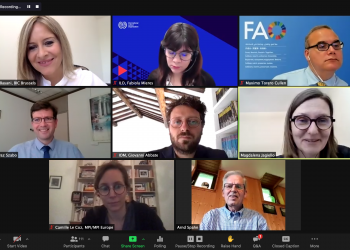FAO-BIC Explore the role of the seasonal labor migration for the sustainability of food systems
“We have to remember that our food security depends on the respect of our agri-food workers’ rights,” said Maximo Torero Cullen, the FAO’s Chief Economist, at a webinar co-hosted by the Food and Agriculture Organization of the United Nations (FAO) and the Brussels Office of the Baha’i International Community (BIC) on 2 June. “The pandemic has shown us how indispensable migrants are… but it has also rightfully put the spotlight on the poor working and living conditions in the [agricultural] sector and the invisibility of these workers.”
Each year, tens of thousands of people from Africa travel to Europe to work alongside a declining national agricultural workforce on farms in EU member states in an industry that is increasingly becoming dependent on migrant seasonal workers. When the pandemic disrupted international travel in April 2020, the spring harvest throughout Europe was thrown into jeopardy, revealing the extent of the EU’s reliance on seasonal workers and their difficult living conditions.
Rethinking and bettering seasonal labour mobility in the agriculture sector, as contributing to improve its benefits and wins for all stakeholders, including for migrant workers and countries of origin, was discussed at this second event of a dialogue series co-hosted by FAO and the Brussels Office of BIC. The series aims at exploring different dimensions of the link between agriculture and migration in the context of the Africa-Europe Partnership. The previous meeting hosted on 10 February 2021 looked at how the non-sustainability of rural settings in Africa is a predominant driver of migration.
“What the series highlights is that our current economic and agricultural systems and their implications for migration, the environment, nutrition, and livelihoods need to be closely examined. The way that agricultural affairs are organized is not sustainable or equitable, be it in Europe, Africa, or anywhere else in the world. There are fundamental questions that need to be closely examined in the light of principles such as the oneness of humanity,” said Rachel Bayani of the Brussels Office of the BIC.
Dr. Torero Cullen and the other panelists, representatives of the International Organization for Migration (IOM), the International Labour Organization (ILO), the European Commission departments for Agriculture and Home Affairs, the Migration Policy Institute Europe (MPI Europe), and the European Federation of Food, Agriculture and Tourism Trade Unions (EFFATT), all emphasized that policies of African and European states and regional bodies aimed at building sustainable food and agriculture systems need to put at the center the interests, safety, and well-being of agricultural workers.
“Many EU Member States frame their seasonal worker schemes primarily in terms of meeting labor-market needs at home,” said Camille Le Coz of MPI Europe. But she highlighted that some countries are looking at other approaches, including framing migration policies around “co-development”—creating arrangements that are beneficial to the sending and receiving countries as well as the workers themselves.
Future events in the series are hoping to explore other dimensions of the link between agriculture and migration, such as the role that education and aspirations play in allowing youth to see in agriculture a sustainable future.
